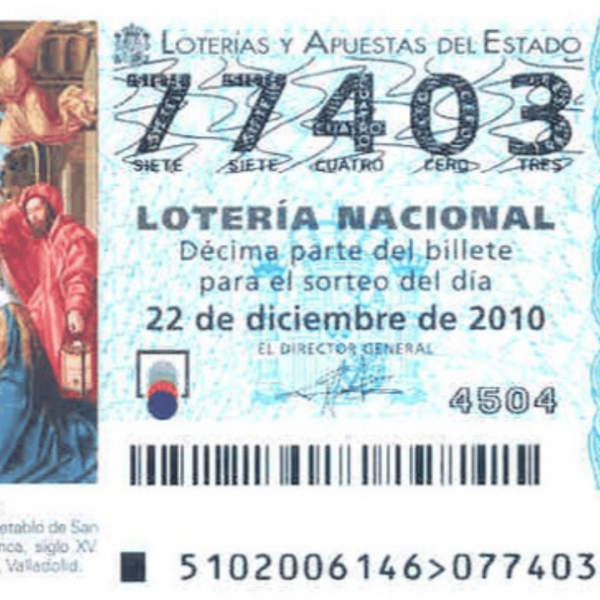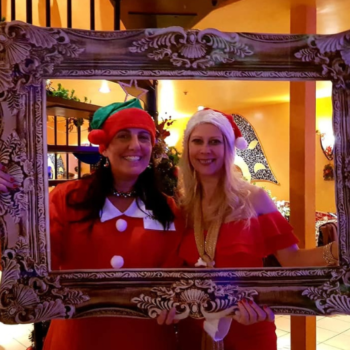

In many non-Spanish-speaking countries, there’s a common misconception about “El Gordo.” Often, it’s mistakenly thought to be the name of the Spanish Christmas Lottery itself.
However, “El Gordo” actually refers to “the first prize,” aptly nicknamed “the fat one” or more fittingly, “the big one.” This is because it represents the largest portion of the prize money in what is known as the world’s biggest lottery.
Unlike the smaller prizes commonly found in other lotteries, “El Gordo” stands out for its sheer size and impact, embodying the festive spirit and excitement of Spain’s celebrated Christmas tradition.
The annual Spanish Christmas lottery is called Lotería de Navidad and you can win up to 4,000,000€.
The Spanish Christmas lottery is the second longest continuously running lottery in the world. It has been running every year since 1811. Today is widely considered to be the biggest lottery in the world.
If you are wondering which is the first longest continuously running lottery in the world, keep on reading. The oldest lottery still active today is the Dutch National Lottery, which has been going strong since the first drawback in 1726 in The Hague.
What is the lottery’s history?
The Spanish Christmas lottery first took place in Cádiz in 1811 and has not missed a year since, continuing through Spain’s civil war between 1936 and 1939.
In 1938, there were actually two Christmas lotteries in Spain, one held in Burgos by General Franco’s Nationalist regime, and the other in Republican-ruled Barcelona.
Winning Numbers and the Excitement of El Gordo
Every year, the excitement in Spain builds up as the drawing of El Gordo’s winning numbers approaches. The process is unique, involving lottery balls that are carefully selected. These balls determine the fate of thousands, as each lottery number holds the potential for changing lives. The event is traditionally held in Madrid‘s San Ildefonso School, where, in a long-standing tradition, the numbers are sung by the students. This moment is a crucial part of the Spanish lottery, eagerly anticipated across the nation.
The Total Prize Money of El Gordo
El Gordo is not just famous for its festive spirit; it’s also known for its grand prize and the total prize money that surpasses most other lotteries. Each full lottery ticket offers a chance to win a substantial amount, contributing to the overall prize pool. The top prize, or the “Gordo,” is a significant sum, often making headlines in the Spanish Express. Besides the main prize, there are many smaller prizes, known as “La Pedrea,” ensuring that the joy of winning is spread widely. The sales of these tickets, often in the form of one tenth of a full ticket, play a big role in raising money for various charities, showcasing the lottery’s commitment to social causes.
El Gordo in the Spanish National Lottery System
El Gordo’s role in the Spanish National Lottery system sets it apart. Unlike most other lotteries, El Gordo offers a unique blend of tradition, community, and excitement. The lottery offices across Spain buzz with activity as ticket sales go up, especially online, where people from different parts of the world join in the excitement. The unique feature of this lottery is its emphasis on sharing – with tickets often bought in groups, sharing the win and the happiness. This aspect of El Gordo not only celebrates winning but also fortifies community bonds, making the event much more than just a lottery draw; it’s a yearly celebration that brings people together, hoping for a happy ending.
When is the Spanish Christmas lottery drawn?
Since December 18, 1811, the day long Christmas Lottery drawings are held according to exactly the same procedure each year. In the past it took place in the Salón de sorteos de Loterías y Apuestas del Estado (Lottery National Hall) of Madrid, while in 2010 and 2011 it was celebrated in the Palacio Municipal de Congresos de Madrid, and since 2012 in Teatro Real in Madrid.
Los niños de San Ildefonso (Pupils of the San Ildefonso School) draw the numbers and corresponding prizes, delivering the results in song to the public. The state-run Televisión Española and Radio Nacional de España, and other media outlets, broadcast the entire draw, which currently takes place on December 22 each year.
How does it work?
To buy a whole ticket, and thus have a chance of winning, costs 200€, hence many people’s preference for a 20€ décimo, or tenth of a ticket. This sharing out of a whole ticket, often amongst family members, work colleagues or friends, makes the Christmas lottery a highly social event.
This sharing aspect is the secret of the high degree of participation; no one wants to be the only member of a group that did not get a winning ticket. Did you buy yours?
¡Buena suerte! (Good luck!)
What is the meaning of El Gordo?
El Gordo translates to “The Fat One” in English. It is a term used for the top prize in the Spanish Christmas Lottery. This name reflects the large size of the prize, being the biggest in the lottery. El Gordo is a significant part of Spanish festive traditions, symbolizing luck and prosperity.
How much is El Gordo?
The value of El Gordo varies each year. It’s known for being a substantial sum, often one of the largest in the lottery world. This top prize in the Spanish Christmas Lottery is notable for its size, drawing national and international attention.
What nationality is associated with El Gordo?
El Gordo is distinctly Spanish. It’s an essential part of Spain’s Christmas Lottery, a tradition steeped in Spanish history and culture. This lottery, celebrated every year, is a notable event in Spain, with El Gordo being its most famous prize.
Who celebrates El Gordo?
El Gordo is celebrated by the Spanish people. It’s a central part of Spain’s Christmas festivities. Each year, Spaniards eagerly participate in this lottery, making it a widely celebrated event. It’s not just limited to Spain, as people worldwide also join in, attracted by the large prizes.
What is the name of the Spanish Christmas lottery?
The Spanish Christmas lottery is known as “Lotería de Navidad.” This historic lottery is a cherished annual event in Spain. It’s famous for its grand prizes, including El Gordo, and brings together communities in a festive spirit every December.
How much does a ticket cost in the Spanish Christmas lottery?
In the Spanish Christmas Lottery, a full ticket, known as a “billete,” typically costs 200€. However, many opt for a “décimo,” a tenth of a full ticket, which costs 20€. This allows more people to participate by sharing the cost and the potential winnings.
What is Spain’s holiday lottery?
Spain’s holiday lottery, celebrated during the Christmas season, is called “Lotería de Navidad.” It’s a special annual event, deeply rooted in Spanish culture. This lottery is known for its generous prize pool and is a time of great excitement and social gathering across the country.
Which is the best Spanish lottery to play?
Among various lotteries in Spain, the most acclaimed is the “Lotería de Navidad,” also known as the Christmas Lottery. It stands out due to its tradition, communal involvement, and notably high chances of winning compared to other lotteries. Its widespread popularity makes it a top choice for many.
What is the El Gordo tradition in Spain?
The El Gordo tradition in Spain revolves around the drawing of the biggest prize in the Christmas Lottery. This tradition is a festive highlight, where families and friends often gather to watch the live draw. It’s a time of hope and joy, with people sharing tickets and dreaming of winning the significant “El Gordo” prize. This event is more than just a lottery; it’s a cherished part of Spanish Christmas celebrations.
How long does El Gordo last?
El Gordo, the main event of Spain’s Christmas Lottery, takes place on a single day. The drawing occurs annually on December 22nd. Despite being a one-day event, the excitement and anticipation for El Gordo build up over weeks, making it a long-awaited highlight of the festive season in Spain.
What are the odds of winning El Gordo?
The odds of winning the El Gordo prize in the Spanish Christmas Lottery are relatively favorable compared to many other lotteries. Each ticket has a chance to win some prize, with a variety of prize categories available. The format of the lottery, which includes numerous smaller prizes along with the grand El Gordo, increases the overall likelihood of winning something.








